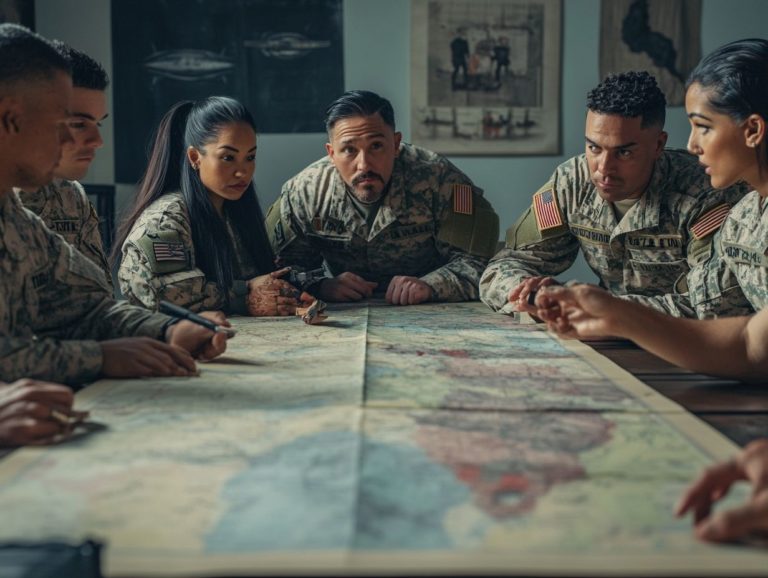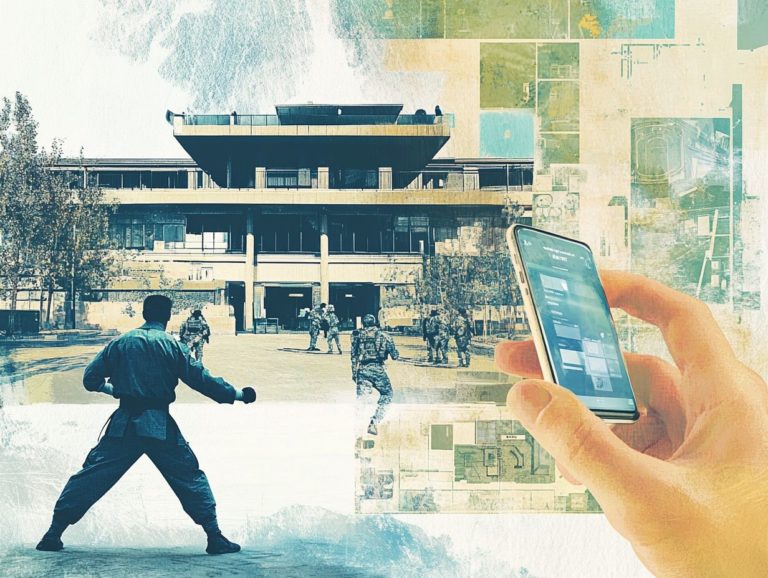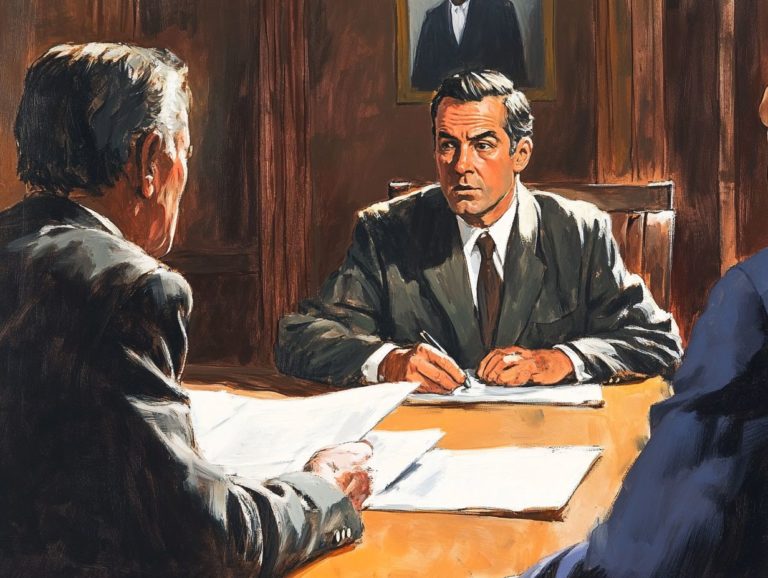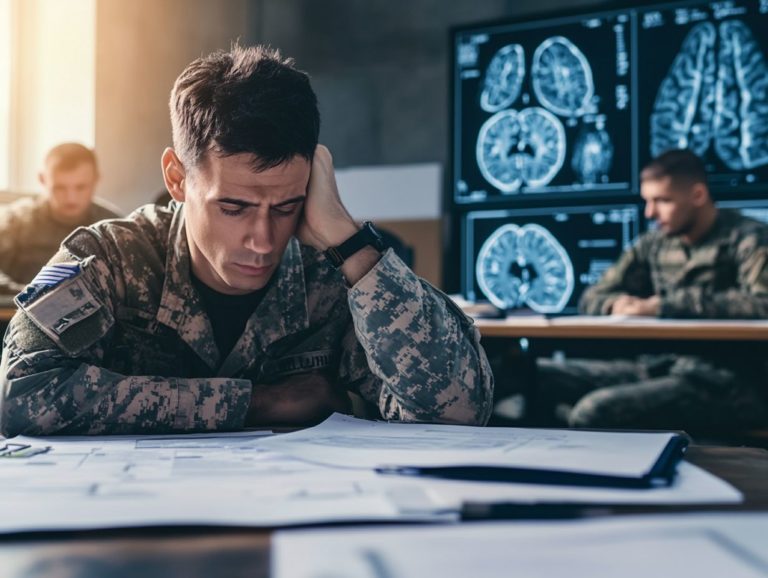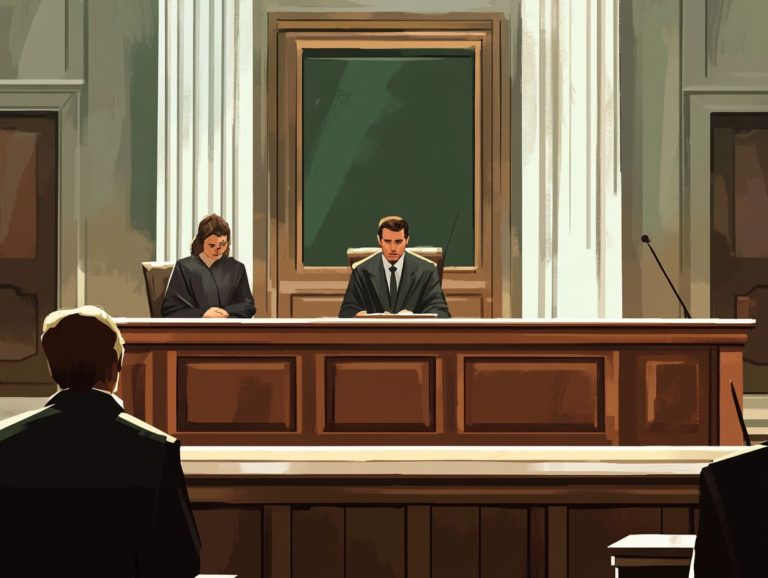Gathering Evidence for a Strong Defense
Knowing why evidence matters is vital when facing criminal charges. It can significantly affect your case’s outcome and help you build a strong defense.
Evidence is the backbone of the arguments presented in court. It shapes how juries react and influences their perception of your innocence or guilt. For instance, in DUI cases, gathering evidence properly can be the critical factor between a conviction and a reduction of charges.
Recognizing how to collect and present evidence effectively is essential for both skilled attorneys and your constitutional rights.
Contents
- Types of Evidence
- Testimonial Evidence
- Documentary Evidence
- Gathering Physical Evidence
- Gathering Testimonial Evidence
- Gathering Documentary Evidence
- Using Evidence in a Defense
- Frequently Asked Questions
- What is the importance of gathering evidence for a strong defense?
- What types of evidence can be used in a strong defense?
- How should I go about gathering evidence for my defense?
- What should I do if I discover new evidence after my defense has already been presented?
- Can I use social media posts as evidence in my defense?
- What should I do if I believe crucial evidence has been tampered with or destroyed?
What is Evidence and Why is it Important?
Evidence includes any material or testimony presented in court to prove a claim or argument. Its significance goes beyond merely supporting the presumption of innocence; it establishes reasonable doubt regarding the prosecution’s case against a defendant.
You will encounter different types of evidence, such as witness testimonies, forensic data, and documentary proof. Each type can profoundly influence jury perceptions and decision-making. Every piece contributes to crafting a compelling narrative that challenges the prosecution’s assertions and strengthens the defendant’s position.
For example, inconsistencies in witness statements or a notable absence of physical evidence can bolster the defense’s credibility. How you present and argue this evidence is crucial it fosters trust with the jury, encouraging them to scrutinize the prosecution’s evidence and ultimately shaping the verdict.
Types of Evidence
Grasping the various types of evidence is crucial for building a formidable defense strategy. Evidence can be categorized into three main types:
- Physical evidence
- Testimonial evidence
- Documentary evidence
Each type plays a distinct role in establishing the facts of a case, ensuring that your defense stands on solid ground.
Physical Evidence
Physical evidence refers to tangible materials you can present in court, such as weapons, fingerprints, or DNA. This evidence is vital for proving claims in a defense case. You must use proper collection techniques to ensure its admissibility and relevance during legal proceedings.
In criminal law, various forms of physical evidence influence case outcomes. Items like clothing, hair samples, and even digital footprints can provide essential insights into a crime’s nature, significantly affecting the types of charges, from theft to homicide.
Collecting evidence accurately is vital! Any misstep could lead to the exclusion of evidence, jeopardizing your defense strategy. Mistakes may arise from inadequate documentation or lapses in the process of handling evidence, known as the chain of custody. This process ensures the integrity of the evidence and helps you avoid pitfalls that could compromise your case.
Testimonial Evidence

Witnesses share what they saw or know. Their accounts are vital to your defense.
Understanding how to identify and prepare trustworthy witnesses is essential for reinforcing your arguments. These individuals must express their narratives clearly and confidently, with a solid grasp of the facts. Factors such as prior experiences, demeanor during questioning, and their ability to recall details all contribute to a witness’s reliability.
Effective courtroom conduct is equally important. Well-prepared witnesses who maintain their poise under pressure can strengthen your defense. Ultimately, judiciously presented testimony not only establishes facts but also shapes the narrative that resonates with jurors during deliberations. This makes it an invaluable tool in your pursuit of justice.
Documentary Evidence
Written materials, like contracts or emails, can back up your case. Organizing these properly is key during the legal process.
In criminal cases, various forms of documentary evidence like financial records, witness statements, and surveillance footage are essential for creating a compelling narrative.
You must ensure that these documents are relevant and allowed in court, adhering to established legal standards. Your ability to retrieve, catalog, and present these materials clearly can significantly influence a jury s perception and the trial s overall outcome.
Meticulous preparation and attention to detail transform simple paperwork into a powerful tool in your pursuit of justice.
Gathering Physical Evidence
Collecting physical evidence is essential. It can greatly influence the outcome of your trial.
This process requires you to collect evidence meticulously it s crucial for your defense!
Collection and Preservation Techniques
Collecting and preserving evidence correctly is crucial. Mistakes can lead to evidence being thrown out.
Using proper containers, like evidence bags or boxes, prevents contamination and degradation. Meticulous documentation is also vital; recording details about who handled the evidence means you can trace its handling.
Beware of common pitfalls. Neglecting to secure the crime scene or mishandling evidence can jeopardize your entire case. Defense attorneys often exploit lapses in the evidence collection process, like improper labeling, which can undermine the credibility of your findings.
By mastering these techniques, you can strengthen your arguments and navigate the complexities of the judicial system effectively.
Gathering Testimonial Evidence
Gathering testimonial evidence strengthens your defense. Strong witness accounts provide essential support for your arguments.
Employing effective interviewing techniques can greatly elevate the quality of this evidence, ensuring that your defense is robust and compelling.
Interviewing Witnesses and Preparing Statements
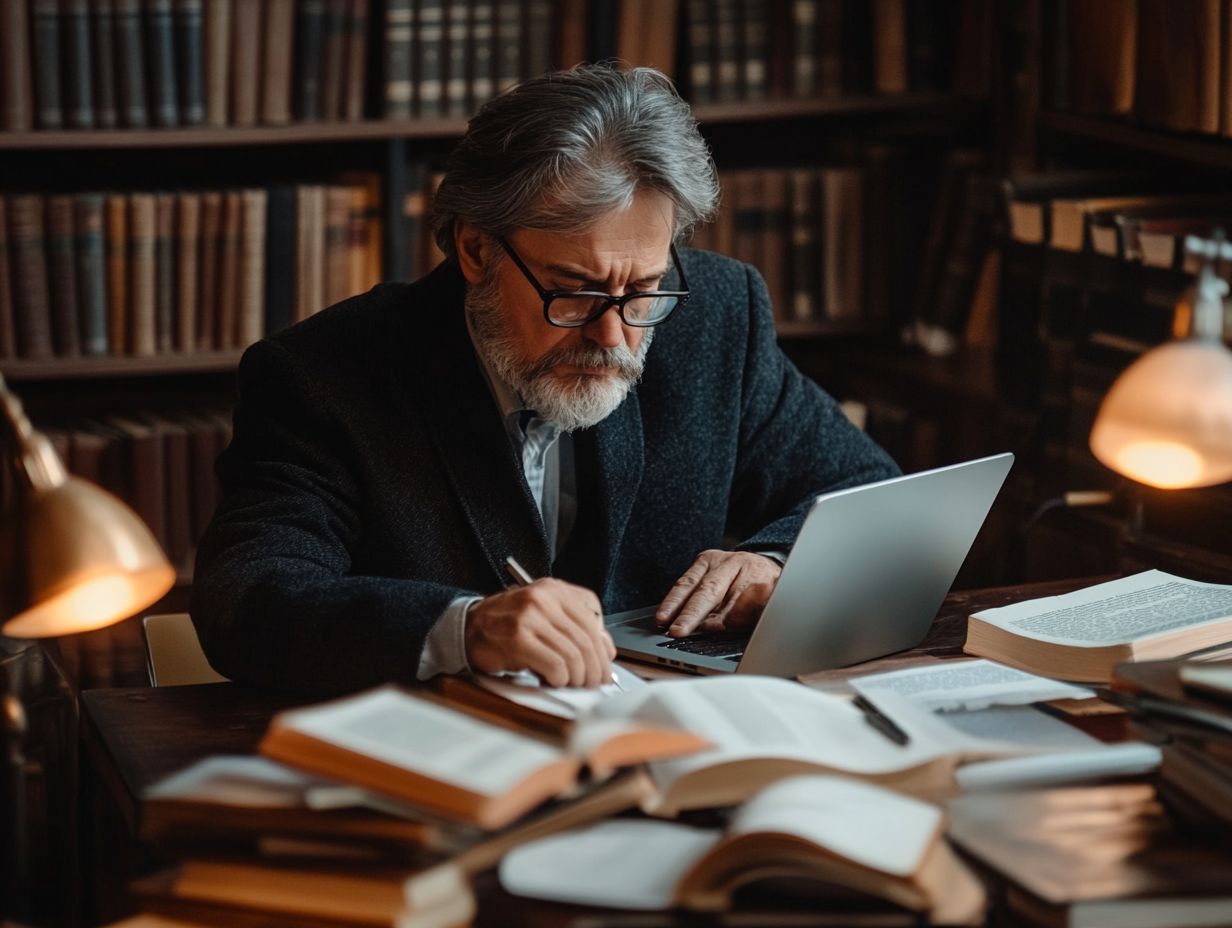
Interviewing witnesses and preparing statements thoughtfully is essential for gathering quality testimonial evidence that can effectively support your defense case. Ensuring that your witnesses are credible and well-prepared can significantly shape the jury’s perception.
To achieve this, it’s vital to engage in a thorough pre-interview process. This means asking open-ended questions that allow witnesses to share their narratives freely while also providing guidance on the key points that align with your defense strategy.
Practicing active listening can help you uncover crucial details. It fosters trust and eases the stress of recounting potentially traumatic events.
By helping witnesses structure their responses clearly, they can deliver concise and compelling statements that enhance overall credibility. This ultimately ensures that their accounts carry greater weight in the proceedings.
Gathering Documentary Evidence
Gathering documentary evidence with precision is essential for fortifying your defense case. This evidence includes vital records that can substantiate the claims presented during the trial.
Employing effective strategies to obtain and carefully organize important documents will significantly enhance the quality and impact of this evidence, ensuring you are thoroughly prepared for what lies ahead.
Obtaining and Organizing Relevant Documents
Obtaining and organizing relevant documents is crucial for gathering the documentary evidence that bolsters your defense arguments. This process demands meticulous attention to detail and often benefits from legal advice to navigate the complicated rules and regulations of the law effectively.
The essential documents you’ll need typically include:
- witness statements
- expert reports
- medical records
- any legal correspondence pertinent to your case
A highly effective strategy for organizing these materials is to establish a comprehensive digital filing system, categorized by type, date, or relevance. This method makes it easy to find documents and work together with your legal team.
Without their expertise, you risk making missteps that could jeopardize your position, underscoring the necessity of professional guidance throughout the entire process.
Using Evidence in a Defense
Utilizing evidence effectively in a defense case goes beyond mere presentation; it requires a nuanced analysis of its significance in bolstering the overall trial strategy.
The manner in which you present this evidence can profoundly shape the jury’s perceptions and ultimately impact the outcome of the case.
Presenting and Analyzing Evidence in Court
Presenting and analyzing evidence in court is a multifaceted endeavor that demands a profound understanding of courtroom dynamics and defense strategies. Your ability to present effectively can significantly shape how juries perceive and react to the evidence, influencing the trial’s outcome.
To elevate the clarity and persuasiveness of your evidence, consider employing visual aids such as charts, diagrams, and multimedia presentations. By incorporating these visuals, you enable jurors to grasp complex information more easily, making it relatable and memorable.
Before the trial commences, it’s crucial to conduct a thorough analysis of each piece of evidence. This ensures that it not only bolsters your defense narrative but also stands up to scrutiny during cross-examination. Strategically aligning your evidence with key themes and maintaining clear communication throughout the trial are vital components in constructing a compelling case.
Frequently Asked Questions

What is the importance of gathering evidence for a strong defense?
Gathering evidence is crucial for building a solid defense in any legal case. It allows you to present facts and information that support your claim, which can greatly impact the outcome of your case.
What types of evidence can be used in a strong defense?
You can use different types of evidence. This includes physical evidence, witness testimonies, expert opinions, and documentation like contracts or emails.
Gathering a variety of evidence is crucial for a strong defense.
How should I go about gathering evidence for my defense?
Work closely with your legal team to identify relevant evidence. They can guide you on the best ways to collect and preserve it.
This may involve interviews, investigations, or document requests.
What should I do if I discover new evidence after my defense has already been presented?
If you find new evidence that could strengthen your defense, notify your legal team right away.
They can advise you on the best course of action, including whether to file a motion for a new trial.
Yes, social media posts can be used as evidence in some cases. However, you need to get permission from the person who posted it and authenticate the posts to ensure their validity in court.
What should I do if I believe crucial evidence has been tampered with or destroyed?
If you suspect evidence has been tampered with or destroyed, inform your legal counsel immediately.
They can help you take appropriate action, such as requesting a preservation order to prevent further tampering.

